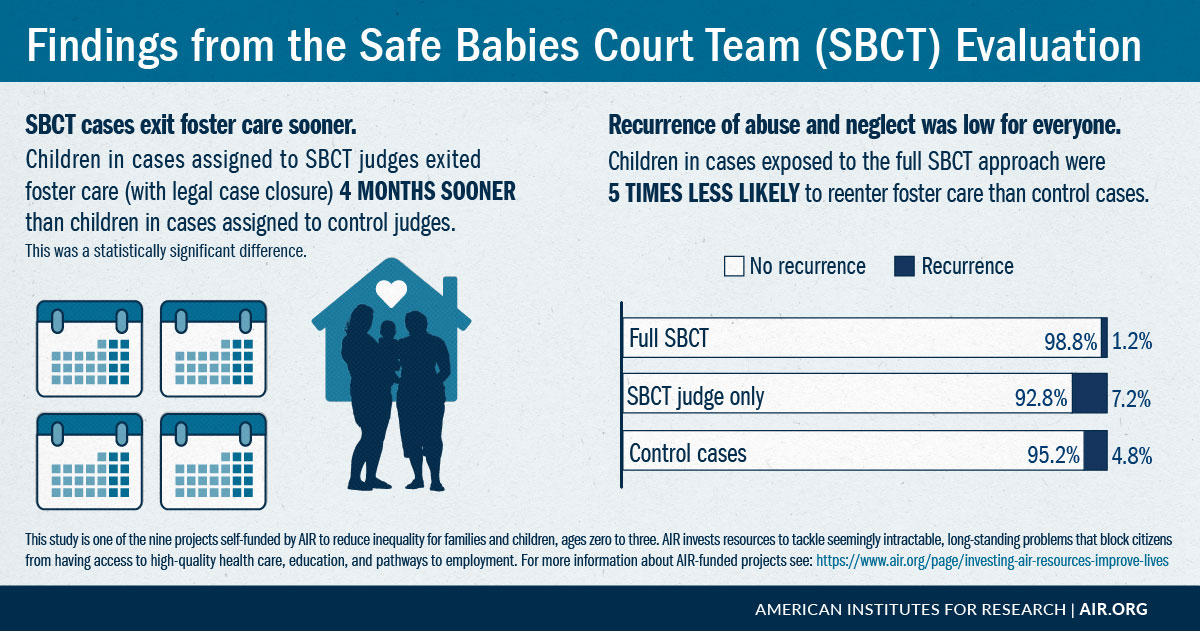Changing the Trajectories of Children in Foster Care: The Safe Babies Court Team Evaluation

Of the more than 680,000 children in foster care in the U.S., 31 percent are age 3 and younger. Overall, children in foster care are at risk for poor developmental outcomes, including increased rates of poor health, higher rates of depression and anxiety, more attention deficit hyperactivity disorder and conduct disorders, more problems in school, and increased rates of incarceration and suicide. Children ages 3 and younger face specific vulnerabilities because this is the stage of development when they form secure attachments with caregivers, which ultimately affects their future developmental trajectory. According to the U.S. Department of Health and Human Services, the average time spent in foster care was 19 months in 2018. Both children and families often do not receive the supports they need during this time.
The Safe Babies Court Team™ (SBCT), created by ZERO TO THREE, is an approach that aims to reduce the time a child spends in foster care before reaching a permanent, safe home. The approach also aims to improve the long-term well-being of children and families in the child welfare system. This approach connects babies and their families with support and services designed to promote healthy child development while working to ensure a safe and speedy exit from foster care. ZERO TO THREE provides support at the local level, such as training and ongoing technical assistance for each Safe Babies Court Team site. Local staff include the Safe Babies Court Team judge and community coordinator, plus two local teams referred to as the “family team” and the “stakeholder team.”
Evaluation of the SBCT
- Jill Bowdon, Project Director, SBCT evaluation
AIR conducted a mixed-methods experimental evaluation of the approach in three locations: Little Rock, Arkansas; Tulsa, Oklahoma; and Des Moines, Iowa. The approach had already been in operation in these locations when the evaluation began. Researchers compared the time children spent in foster care and the likelihood of recurrence of abuse or neglect for three groups:
- 123 cases that had access to the entire SBCT approach, including the community coordinator, an SBCT-trained judge, the family team, and community level supports;
- 598 cases that had access to an SBCT-trained judge but not to the community coordinator, the family team, or community-level supports; and
- 1,120 cases that moved through the child welfare system in the usual way.
The courts randomly assigned cases to either a SBCT trained judge or a judge who had no training in the SBCT approach.

View full-page infographic (PDF).
Evaluation Results
This evaluation provides the first experimental evidence that the SBCT approach had a positive impact on maltreated infants and toddlers and their families.
- Cases assigned to judges trained in the SBCT approach exited foster care sooner than cases assigned to the control condition. The median time spent in foster care was lower for SBCT cases than control—a roughly 4-month difference that was statistically significant. This was true for both the cases that had access to the full SBCT approach as well as cases that were adjudicated by an SBCT judge, but did not have access to the community coordinator, the monthly team meetings, or the SBCT core components.
- While not statistically significant, cases that received the full SBCT approach were 5 times less likely to experience a recurrence of abuse or neglect. Findings on recurrence of abuse and neglect suggested that to prevent future re-entry into foster care requires the full SBCT approach, including access to the SBCT judge, the community coordinator, the monthly team meetings, and the SBCT core components.
The goal of SBCT is to achieve timely permanent and safe homes for maltreated infants and toddlers, and this experimental evaluation suggests that achieving both outcomes requires investment in the full SBCT approach.
